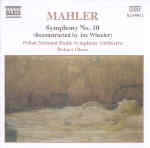Two things become immediately obvious on hearing this premiere recording of the Joe Wheeler version of Mahler 10: first, Robert Olson (of Colorado Mahler Fest fame) understands the work and conducts it marvelously; second, Joe Wheeler was a lousy orchestrator. Both qualities emerge in the opening Adagio. Listen to Olson’s intelligently contrasted tempos between the principal theme and the sardonic second subject, and to the excellent balances he secures between strings and horns (especially from 5’30” on). Then listen to Wheeler’s stupid timpani interjections at the movement’s climax: a less Mahlerian sound could scarcely be imagined.
Rather than take the performance moment by moment, a few general observations are in order. Wheeler treats his ensemble like so many textbook orchestrators: as a string band with wind, brass, and percussion accessories. This is not how Mahler thought of the orchestra–not ever, but particularly not in his late works. He treats each instrumental family as an independent mini-ensemble functioning within the larger whole, giving each movement its special sonic focus. The easiest way to grasp this fact is to consider his percussion writing. Mahler’s late symphonies take as their basic unit timpani, cymbals, bass drum, tam-tam, triangle, glockenspiel, and more often than not snare drum and deep bells. Where Mahler would have emphasized triangle and glockenspiel in the scherzos, bass drum and tam-tam in the finale, Wheeler batters away crudely at the snare drum throughout (save for the first movement) and spends far too much time highlighting the xylophone, while his writing for the other instruments, to the extent he uses them, singularly lacks both idiomatic color and independent motivic significance. His recourse to timpani and cymbals sounds particularly inept.
Similarly, Wheeler’s treatment of the brass cries out for greater contrapuntal clarity and leans much too heavily on the horns. He hasn’t a clue what to do with trombones, tuba, and especially the trumpets, a fact that becomes obvious as the second movement progresses. The woodwinds get solos now and again but enjoy little independent existence as a section, and overall Wheeler’s work lacks definition at both the top and bottom of the orchestra. There’s too much detail squeezed into middle registers, just the opposite of the true, “decompacted” Mahler sound. For example, in the two scherzos Wheeler’s arguably denser than Cooke, but much of his added counterpoint comes across as pasted onto the texture rather than organically conceived.
On the plus side, listeners used to Cooke or Mazzetti may well find Wheeler’s sometimes very different transitions and harmonic substrate in the fourth movement quite interesting. His rapid tempo for the opening of the finale, though, simply sounds wrong and fails to offer sufficient contrast to the ensuing allegro. Wheeler’s decision to make the central interlude (before the return of the fast music) loud and contrapuntally busy also comes across as quite clumsy, even crude, when compared to Cooke’s noble simplicity, and the climactic return of the first movement’s dissonant chord seriously lacks impact and therefore dramatic significance.
That said, it would be difficult to conceive a performance better shaped and conducted than what Olson offers here. He clearly takes great pains to do justice to Wheeler’s vision of the work, touches in some very generous string portamento where it does the most good, and secures mostly committed playing from the Polish National Radio Symphony Orchestra. What weaknesses there are (tepid brass and percussion) can’t really be laid at his door, as they tend to emphasize Wheeler’s failings in the same departments. The recorded sound, while nicely balanced in quieter passages, shows evidence of congestion at climaxes (possibly also Wheeler’s fault–it’s difficult to tell) and seriously lacks resonance in the bass. In sum, Wheeler doesn’t challenge Cooke as a realization of Mahler’s Tenth, but in his plain-spoken and unidiomatic way he’s often preferable to Mazzetti’s even less appealing, Puccini-esque approach.
The notes, it must also be said, are inadequate. Today, with many recordings of Cooke and at least two of Mazzetti available, there’s no longer any need to plead the case for a completion of the symphony. Rather, what we need, and what we don’t get, is a clear discussion of the specific details of this version (there’s not even a basic instrumentation list) and some pertinent biographical information on Joe Wheeler himself, particularly his training, qualifications, and how he came to set himself this particular task. Still, Naxos deserves credit for making this project available at a price that every Mahlerian can afford, and it’s hard to imagine any true lover of this composer not giving this admirably realized interpretation (on Olson’s part) a very serious listen. I’d love to hear Olson do Cooke with a really great orchestra.
































